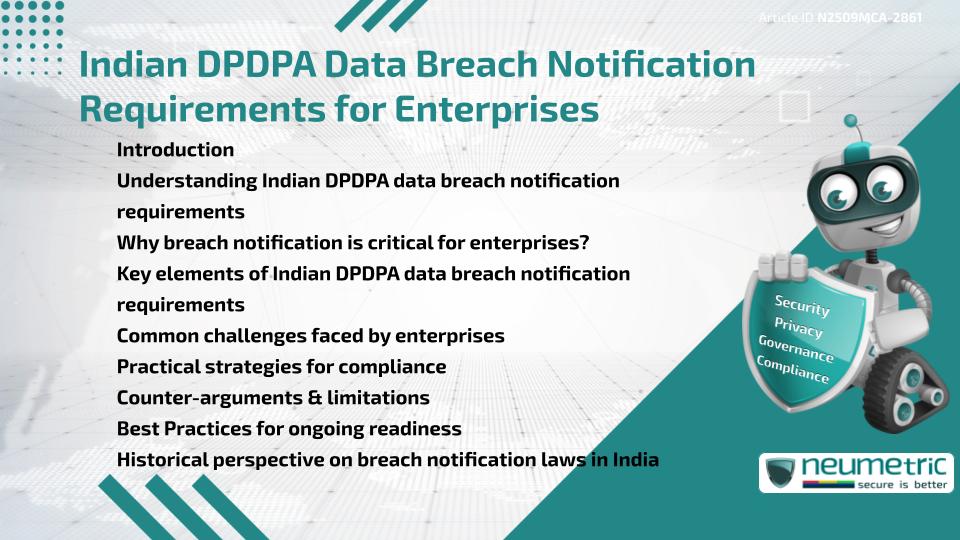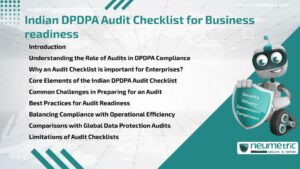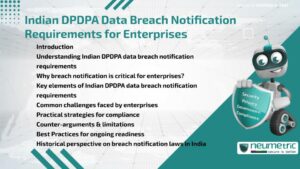Table of Contents
ToggleIntroduction
The Indian DPDPA data breach notification requirements set strict obligations for enterprises to report data breaches involving Personal Data. These rules, established under the Digital Personal Data Protection Act [DPDPA], aim to ensure accountability & transparency whenever Sensitive Information is compromised. Non-compliance can result in penalties, reputational harm & loss of consumer trust. This article explores the requirements, why they matter, challenges enterprises face & practical strategies for compliance.
Understanding Indian DPDPA data breach notification requirements
The DPDPA requires enterprises to notify the Data Protection Board of India & affected individuals when a data breach occurs. Notification must be prompt & include details about the breach, potential Risks & actions taken to mitigate harm. According to the Ministry of Electronics & Information Technology (MeitY), the aim is to give individuals the ability to protect themselves from Risks such as identity theft, fraud & misuse of their Personal Data.
Why breach notification is critical for enterprises?
Breach notifications are more than a compliance checkbox. They demonstrate that enterprises take responsibility for protecting Customer Data & are transparent in the event of a security failure. Timely notifications reduce the Risk of regulatory fines & help maintain trust. Global Standards, such as those highlighted by the OECD, also emphasize the importance of transparency in building consumer confidence in digital services.
Key elements of Indian DPDPA data breach notification requirements
An effective breach notification under DPDPA must include:
- Description of the breach & categories of affected Personal Data.
- Potential Risks & consequences for individuals.
- Steps taken by the enterprise to contain & mitigate the breach.
- Contact information for individuals to seek clarification.
- Timelines for reporting, ensuring notification occurs without undue delay.
These elements ensure both regulators & individuals have the information needed to act quickly.
Common challenges faced by enterprises
Enterprises often struggle with identifying breaches quickly, determining the scope of compromised data & coordinating responses across teams. Smaller Organisations may lack the resources to conduct forensic investigations, while larger enterprises may face bureaucratic delays in approving notifications. There is also the challenge of balancing transparency with protecting sensitive internal details.
Practical strategies for compliance
To comply with Indian DPDPA data breach notification requirements, enterprises should:
- Establish internal Incident Response teams.
- Conduct regular breach simulations & tabletop exercises.
- Maintain updated contact lists for regulators & Stakeholders.
- Integrate breach notification processes with Cybersecurity Frameworks such as the NIST Cybersecurity Framework.
By preparing in advance, enterprises can act swiftly & reduce Risks during a real incident.
Counter-arguments & limitations
Some critics argue that mandatory breach notifications may overwhelm regulators & individuals with excessive information, especially in cases of minor incidents. Others suggest that disclosure could harm a company’s reputation disproportionately to the actual impact. While these concerns are valid, the benefits of Transparency & Accountability outweigh the drawbacks, particularly in protecting consumers from harm.
Best Practices for ongoing readiness
Compliance requires more than just having a plan. Enterprises should:
- Regularly review & update notification procedures.
- Train Employees on recognizing & reporting breaches.
- Monitor Threat Intelligence to stay aware of emerging Risks.
- Conduct periodic compliance audits.
Guidance from the Data Security Council of India (DSCI) and TechTarget Security can help enterprises strengthen their readiness.
Historical perspective on breach notification laws in India
India’s journey toward comprehensive Data Protection began with guidelines under the Information Technology Act, 2000. However, these provisions were often criticized as insufficient in addressing modern data Risks. The introduction of the DPDPA marked a significant shift, aligning India with global Data Protection practices such as the EU’s GDPR. The law’s emphasis on breach notifications reflects lessons learned from high-profile breaches both in India & globally.
Takeaways
- Indian DPDPA data breach notification requirements mandate timely disclosure to regulators & individuals.
- Notifications must include details of the breach, Risks & mitigation steps.
- Enterprises face challenges in detection, investigation & coordination.
- Strategies like simulations, training & audits enhance compliance.
- Transparency strengthens trust & aligns India with Global Standards.
FAQ
What are Indian DPDPA data breach notification requirements?
They are legal obligations requiring enterprises to report data breaches to regulators & affected individuals.
Who must be notified in case of a breach?
The Data Protection Board of India & all affected individuals must be informed.
How soon should a breach be reported under DPDPA?
Notifications must be made without undue delay, though exact timelines may be defined by regulations.
What details should be included in a breach notification?
Information on the nature of the breach, Risks, mitigation steps & contact details for inquiries.
Do small enterprises also need to comply?
Yes, all enterprises handling Personal Data are subject to the notification requirements.
Can failure to notify lead to penalties?
Yes, non-compliance can result in Financial penalties & other regulatory actions.
How can enterprises prepare for compliance?
By setting up Incident Response teams, running simulations & aligning with Cybersecurity Frameworks.
Need help for Security, Privacy, Governance & VAPT?
Neumetric provides organisations the necessary help to achieve their Cybersecurity, Compliance, Governance, Privacy, Certifications & Pentesting needs.
Organisations & Businesses, specifically those which provide SaaS & AI Solutions in the Fintech, BFSI & other regulated sectors, usually need a Cybersecurity Partner for meeting & maintaining the ongoing Security & Privacy needs & requirements of their Enterprise Clients & Privacy conscious Customers.
SOC 2, ISO 27001, ISO 42001, NIST, HIPAA, HECVAT, EU GDPR are some of the Frameworks that are served by Fusion – a SaaS, multimodular, multitenant, centralised, automated, Cybersecurity & Compliance Management system.
Neumetric also provides Expert Services for technical security which covers VAPT for Web Applications, APIs, iOS & Android Mobile Apps, Security Testing for AWS & other Cloud Environments & Cloud Infrastructure & other similar scopes.
Reach out to us by Email or filling out the Contact Form…





